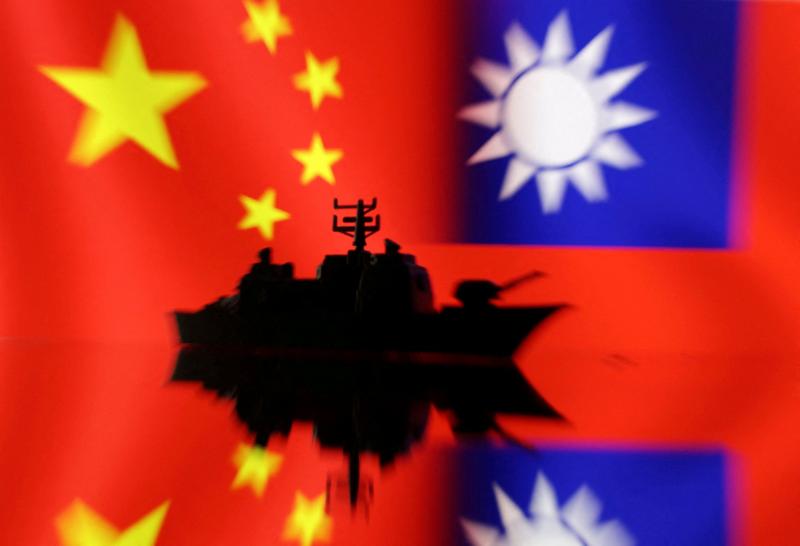China’s live-fire drills held in waters around Niushan Island near Taiwan's Lienchiang County today were part of an annual routine military exercise, the Ministry of National Defense (MND) said.
China might be using the exercise to exert deterrence in the Taiwan Strait, the ministry said, adding that it monitored the situation closely and was analyzing China’s military activities and its intentions.

Photo: Reuters
Premier Cho Jung-tai (卓榮泰) said the military is prepared for all kinds of situation and would not let any accidents happen.
“It is our duty to safeguard Taiwan’s sovereignty and our people’s safety,” he said, adding that the exercise is threatening to regional peace and stability, and it is meaningless and unnecessary to frequently create tension in the Taiwan Strait.
China’s military exercise is intended to undermine Taiwan’s morale with information warfare, said Chen Kuan-hsien (陳冠憲), a researcher at the Taiwan National Security Association.
The drill is a political response to the Whole-of-Society Defense Resilience Committee recently set up by the Presidential Office, as Taiwan’s civil defense is also considered to be pro-independence by China, Chen said.
Some Taiwanese “feel nothing” when China holds military exercises, he said.
The intention of China’s information warfare, such as “expressing love” by saying that it is surrounding Taiwan with a “heart shape,” is to strengthen the impression that “it is no big deal” to hold military drills near Taiwan, he added.
China is progressing its strategy toward Taiwan with a series of activities in a short period of time, Chen said.
The aim is to test reactions from Taiwan and the international community, as modern warfare includes not only traditional hot war, but also diplomacy, communications, economy and technology, he said.
It is best for Taiwan to demonstrate its determination to defend itself, and it is important to bolster civil defense by educating the public on military science, national identity and international situation so as to enhance information literacy, he added.
A maritime safety advisory was issued yesterday by the Maritime Safety Administration in Pingtan in China's Fujian Province, warning vessels to avoid the waters around the Chinese island from 9am to 1pm today, according to several Chinese media outlets.
Niushan is about 80km south of Lienchiang County (Matsu) off Fujian Province and about 165km from Taipei.
The lighthouse on the island is an important landmark that helps vessels navigate the Taiwan Strait, and the island is near a currently suspended ferry route connecting Pingtan and Taipei.
The live-fire exercises around Niushan followed the "Joint Sword-2024B" military drills conducted around Taiwan and its offshore islands on Monday last week, during which China's Coast Guard also took part.
Additional reporting by Fang Wei-li

EUROPEAN TARGETS: The planned Munich center would support TSMC’s European customers to design high-performance, energy-efficient chips, an executive said Taiwan Semiconductor Manufacturing Co (TSMC, 台積電), the world’s largest contract chipmaker, yesterday said that it plans to launch a new research-and-development (R&D) center in Munich, Germany, next quarter to assist customers with chip design. TSMC Europe president Paul de Bot made the announcement during a technology symposium in Amsterdam on Tuesday, the chipmaker said. The new Munich center would be the firm’s first chip designing center in Europe, it said. The chipmaker has set up a major R&D center at its base of operations in Hsinchu and plans to create a new one in the US to provide services for major US customers,

The Ministry of Transportation and Communications yesterday said that it would redesign the written portion of the driver’s license exam to make it more rigorous. “We hope that the exam can assess drivers’ understanding of traffic rules, particularly those who take the driver’s license test for the first time. In the past, drivers only needed to cram a book of test questions to pass the written exam,” Minister of Transportation and Communications Chen Shih-kai (陳世凱) told a news conference at the Taoyuan Motor Vehicle Office. “In the future, they would not be able to pass the test unless they study traffic regulations

GAINING STEAM: The scheme initially failed to gather much attention, with only 188 cards issued in its first year, but gained popularity amid the COVID-19 pandemic Applications for the Employment Gold Card have increased in the past few years, with the card having been issued to a total of 13,191 people from 101 countries since its introduction in 2018, the National Development Council (NDC) said yesterday. Those who have received the card have included celebrities, such as former NBA star Dwight Howard and Australian-South Korean cheerleader Dahye Lee, the NDC said. The four-in-one Employment Gold Card combines a work permit, resident visa, Alien Resident Certificate (ARC) and re-entry permit. It was first introduced in February 2018 through the Act Governing Recruitment and Employment of Foreign Professionals (外國專業人才延攬及雇用法),

‘A SURVIVAL QUESTION’: US officials have been urging the opposition KMT and TPP not to block defense spending, especially the special defense budget, an official said The US plans to ramp up weapons sales to Taiwan to a level exceeding US President Donald Trump’s first term as part of an effort to deter China as it intensifies military pressure on the nation, two US officials said on condition of anonymity. If US arms sales do accelerate, it could ease worries about the extent of Trump’s commitment to Taiwan. It would also add new friction to the tense US-China relationship. The officials said they expect US approvals for weapons sales to Taiwan over the next four years to surpass those in Trump’s first term, with one of them saying